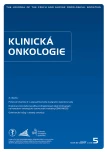Treatment Refusal in Pediatric Oncology
Authors:
A. Špótová; K. Husáková; A. Hrašková; M. Mikesková; J. Puškáčová; S. Hederová; M. Jamárik; E. Rabenseifertová; Z. Jalovecká; A. Kolenova; Z. Šubová
Authors‘ workplace:
Klinika detskej hematológie a onkológie, LF UK a DFNsP, Bratislava
Published in:
Klin Onkol 2017; 30(5): 380-385
Category:
Case Report
doi:
https://doi.org/10.14735/amko2017380
Overview
Background:
Pediatric oncologists are often faced with situations in which parents or guardians refuse recommended treatment for curable childhood cancer. Deciding how to proceed in such situations is an ethical dilemma. The aim of this article is to consider optimal approaches when parents are strongly against oncological treatment, potentially compromising their children’s rights for health care and to the chance for cure.
Cases:
In this paper, we report two cases of treatment refusal from our department and the impact of such decisions on the children themselves. Case no. 1 describes a child with retinoblastoma whose parents refused standard treatment in order to seek alternative treatment abroad. Case no. 2 describes a patient with a primary lymphoma of bone who received treatment by a court order after parental refusal.
Conclusion:
When parents refuse a treatment for potentially curable cancer, the medical team often focuses on the certainty of death without treatment. In the background, there is a smaller but still significant risk that – even if the treatment is eventually accepted or compelled – the child will still die from treatment-related complications or refractory disease, possibly with considerable suffering. The reasons for refusing a treatment vary. The entire medical team is tasked with trying to respectfully understand the reasoning behind the parents‘ unwillingness to accept the treatment, in order to address all possible misunderstandings and to propose solutions that could be acceptable for the parents. In some situations however, it is necessary to resolve the dilemma by legal means in order to protect the life of the child.
Key words:
oncology – ethics – decision making – treatment refusal – legal guardians
The authors declare they have no potential conflicts of interest concerning drugs, products, or services used in the study.
The Editorial Board declares that the manuscript met the ICMJE recommendation for biomedical papers.
Submitted:
7. 8. 2017
Accepted:
7. 9. 2017
Sources
1. Chovancová D, Volčko V. Nespôsobilé osoby a informovaný súhlas. Onkológia 2015; 10 (3): 196–197.
2. Fekete I. Občiansky zákonník 1. Veľký komentár. Bratislava: Eurokódex, 2011; 85.
3. Zákon č. 576/2004 Z. z. Zákon o zdravotnej starostlivosti, službách súvisiacich s poskytovaním zdravotnej starostlivosti a o zmene a doplnení niektorých zákonov.
4. Seneši Z. Kedy môže rodič odmietnuť liečbu dieťaťa? Pediatria pre prax 2015; 16 (2): 83–84.
5. Glasa J, Glasová H. Farmakoekonomika a etika v onkológii: etické dilemy a možnosti ich riešenia. Onkológia 2014; 9 (1): 19–23.
6. Diekema DS. Parental refusals of recommended medical interventions. In: Clinical Ethics in Pediatric. Cambridge: Cambridge University Press 2011 : 14–17.
7. Zákon č. 161/2015 Z. z. § 365 ods. 1 až 5 Civilného mimosporového poriadku.
8. Kolenová A. Onkologické ochorenia v detskom veku. Bratislava: Univerzita Komenského 2014.
9. Kaiserová E, Bubanská E, Oravkinová I et al. Incidencia a kurabilita nádorov v detskom veku v Slovenskej republike. Onkológia 2006; 1 (3): 180–186.
10. Zuzak TJ, Kameda G, Schutze T et al. Contributing factors and outcomes of treatment refusal in pediatric oncology in Germany. Pediatr Blood and Cancer 2016; 63 (10): 1800–805. doi: 10.1002/pbc.26111.
11. Patte C, Zimmermann M, Auperin A et al. Similar results are currently observed in the LMB and BFM studies for B-cell Non Hodgkin’s lymphoma and B-AL allowing future common studies. Pediatric Blood and Cancer 2010; 55 (5): 795.
12. Grootenhuis MA, Last BF. Adjustment and coping by parents of children with cancer: a review of the literature. Support Care Cancer 1997; 5 (6): 466–484.
13. Křivohlavý J. Vážně nemocné mezi námi. Praha: Avicenum 1989.
14. Vágnerová M. Psychopatologie pro pomáhajíci profese. Praha: Portál 2012.
15. Sitorus RS, Moll AC, Suhardjono S et al. The effect of therapy refusal against medical advice in retinoblastoma patients in a setting where treatment delays are common. Ophthalmic Genet 2009; 30 (1): 31–36. doi: 10.1080/13816810802464320.
16. Zákon č. 305/2005 Z. z. o sociálnoprávnej ochrane detí a sociálnej kuratele na zabezpečenie sústavnej ochrany života, zdravia a priaznivého psychického vývinu, fyzického vývinu a sociálneho vývinu dieťaťa.
17. Humeník I. Praktické otázky týkajúce sa informovaného súhlasu nespôsobilých pacientov. In: Informovaný súhlas a inštitút predchádzajúceho priania. Bratislava: Eurokódex 2012 : 112.
18. Caruso Brown A. Refusal of Treatment for Childhood Cancer: A Systematic Review. Pediatrics 2017. In press.
Labels
Paediatric clinical oncology Surgery Clinical oncologyArticle was published in
Clinical Oncology

2017 Issue 5
- Possibilities of Using Metamizole in the Treatment of Acute Primary Headaches
- Metamizole vs. Tramadol in Postoperative Analgesia
- Spasmolytic Effect of Metamizole
- Metamizole at a Glance and in Practice – Effective Non-Opioid Analgesic for All Ages
- Safety and Tolerance of Metamizole in Postoperative Analgesia in Children
-
All articles in this issue
- Potential of Using Vitamin D as an Adjuvant Treatment of Malignant Melanoma
- Controversy in the Postoperative Treatment of Low-grade Gliomas
- The Role of Chemotherapy in the Treatment of Low-grade Gliomas
- Evaluation of Anti-cancer Therapies with Reimbursement Limited to Comprehensive Cancer Centres Using the European Society for Medical Oncology Magnitude of Clinical Benefit Scale
- Treatment Refusal in Pediatric Oncology
- Isocitrate Dehydrogenase Mutations are Better Prognostic Marker than O6-methylguanine-DNA Methyltransferase Promoter Methylation in Glioblastomas – a Retrospective, Single-centre Molecular Genetics Study of Gliomas
- The Anti-apoptotic Mechanism of Metformin Against Apoptosis Induced by Ionizing Radiation in Human Peripheral Blood Mononuclear Cells
- Clinical Oncology
- Journal archive
- Current issue
- About the journal
Most read in this issue
- Controversy in the Postoperative Treatment of Low-grade Gliomas
- The Role of Chemotherapy in the Treatment of Low-grade Gliomas
- Isocitrate Dehydrogenase Mutations are Better Prognostic Marker than O6-methylguanine-DNA Methyltransferase Promoter Methylation in Glioblastomas – a Retrospective, Single-centre Molecular Genetics Study of Gliomas
- Treatment Refusal in Pediatric Oncology
